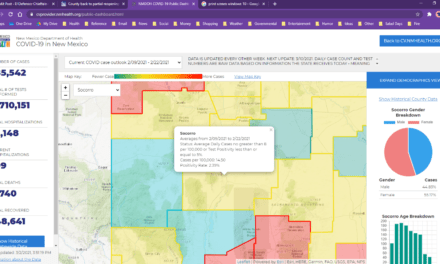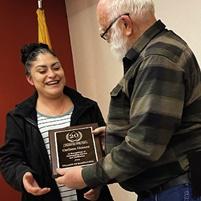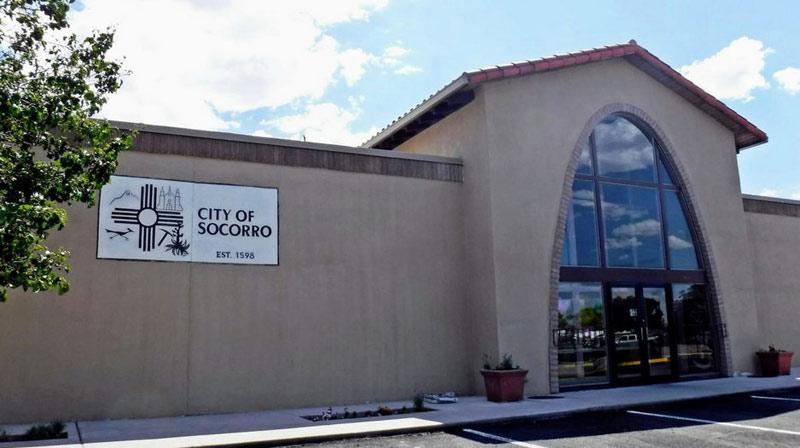Socorro County commissioners have committed to significantly lower spending on local senior centers from county funds, and 12 county employees may lose their jobs as the local senior services program changes hands.
The Non-Metro Area Agency on Aging terminated Socorro County’s contract to operate the senior centers, because the county began using detention center inmates to prepare food without notifying the agency and allowing them to vet the inmate work program before it was implemented.
Socorro County commissioners discussed the future of the senior services program during an emergency meeting Tuesday.
Monica Abeita, the executive director of the North Central New Mexico Economic Development District, had already spoken with the city of Socorro’s mayor earlier in the day.
She came before the commissioners to find out how much senior center funding Socorro County will tentatively commit to. With a rough financial commitment from the county, she can work out a proposal with the potential new program provider about how it will run the program.
She asked the county for $240,000, including $150,000 in cash and $90,000 in-kind services. Funding for the centers also comes from federal, state and city dollars.
Among other things, the county has paid for insurance, utilities and maintenance costs at the senior center buildings.
However, the Socorro County commissioners and county manager Michael Hawkes have been raising concerns about the cost of running the senior center program for at least a year, asking for more state funding and a lowered financial contribution from the county.
With operations being taken away from the county and no guarantee the existing senior center employees will be able to keep their jobs, the commissioners only committed to matching the city of Socorro’s financial support for the program with $15,000 cash and use of the Socorro County owned senior center buildings in Veguita and Magdalena.
The county had declined to sign the RFP to continue running the senior programs last June because of the cost, but the county agreed to several extensions to keep running the program, hopeful that the legislature would provide more funding, Hawkes said in a follow-up interview.
The state provided approximately $320,000-$350,000 in funding for the full fiscal year, Hawkes said, while the county will have spent at least $300,00 by mid-March and was expected to spend over the state contribution by the end of the fiscal year.
“I’m kind of amiss why they’re still wanting the county to put in the brunt of the money, when you have an incorporated city where most of the services are taking place, 85 percent,” Hawkes said. “I don’t understand why the state isn’t asking the city to be fiscal agent and do the (insurance) coverage and to put in the 200 and some thousand. The county would be glad to put in their fair share, 15 percent of the overall operational costs.”
Who will take over operating the senior centers?
The potential new provider considering taking over senior center operations in Socorro County is Adelante, a senior care and services nonprofit that already runs senior center programs elsewhere in the state.
Adelante has previously approached the county with an offer to run the Socorro County program, Hawkes told the commissioners. According to Hawkes, that previous offer included employing nine of the existing senior center employees and proposed reducing senior center hours and services to reduce program cost.
Abeita emphasized that Adelante is not the only provider that was approached about taking over the Socorro program, just the only provider interested in doing so.
She said that she could not make promises about employment on Adelante’s behalf, but she believed it’d be open to the current employees applying for positions to continue working at the centers.
“I know they’re very concerned about staffing, and I know that they would take a very good look at all the existing employees.”
The county contract will end March 17, and the operations handover is scheduled for March 18.
Work Program
Trusties began preparing meals in the senior center kitchen Feb. 6, and the county stopped using the work program by Feb. 10, immediately after Non-Metro AAA told them to stop.
Abeita said that there are some situations where the trusties working could have been appropriate, and Non-Metro AAA would have been willing to review and work on a program with the county, but the agency found out about the work program secondhand after it had already been implemented.
“We ran the names we have through New Mexico courts and these did not seem like individuals that were safe to be working in a senior center. That’s all review that should have been done ahead of time,” she said.
The contract was terminated because they felt the liability was too high to the organization, the state and seniors, said Abeita.
Athena Gassoumis with the R.I.S.E. program, which vetted the trusties, spoke to make sure it was on the record that the work program followed every correctional facility guideline and detention center guideline to ensure community safety.
“So yes, if you look at people’s background checks that are at the detention center, well, are they going to be golden? Absolutely not, but that’s the whole point of the program, is for them to give back,” Gassoumis said.
She acknowledged that protocol may not have been followed with notifying Non-Metro AAA but said the work program had been a win-win, saving the county money on labor and giving the trusties something to look forward to.
“They cried when the plug was pulled,” she said.
Abeita said she had nothing against the R.I.S.E. program and wished the work program could have been discussed with Non-Metro AAA before it began.
“This is one thing that happened in addition to a lot of things over the past year and a half with the county manager being unhappy with the budget, saying, ‘We cannot afford to run this program this way. This is not working for us.’ And we felt like maybe it’s time to give someone a chance to run the program,” Abeita said.
Tensions Over Funding
The Socorro County commissioners and county manager Michael Hawkes have been asking for more state dollars to fund the senior services program for over a year, arguing that the program is mandated for the state not the county, and the cost interferes with county mandated programs like maintaining roads.
Abeita said she felt some of the commissioners’ comments about funding were incorrect.
“I just need to explain, as I have many times before, that the design of this program includes a local match,” she told the commissioners. “We’re not singling out Socorro County or any local government to provide a local match.”
The program was created by the federal Older Americans Act, passed in 1965. Abeita said that the act anticipates a local match for state funds in money and in-kind resources from communities served by senior centers.
“I believe the state money doubles what is given by the feds. The feds are actually the lowest contributor to this program, if we want to point fingers.”
Abeita said she agreed with the commissioners that the program is underfunded, but she has no control over how state dollars are allocated, and the county and Non-Metro AAA need to work together to get funds for the program.
“This program is underfunded. It’s underfunded in every single senior center in this state, and we requested $7.5 million from the legislature. We might get an additional $4.5 maybe, but we’re not going to get $7.5 requested. I don’t know how to fix that. I’ve been talking to all the legislators I can the entire session. I mean, we are on your sides with this. We don’t disagree with that at all.
”However, what I’m trying to say is that this is a situation that’s going on in all of our centers. We all have to work together to get the funds where they need to be. The other thing is with the aging population that we have, I can’t tell you if we had $10 million, we would be there. We have more and more seniors with more and more complex needs all the time, and so it’s just a difficult situation.”
Non-Metro AAA has worked with the county to reduce the county’s senior center expenses, said Abeita. She said Socorro County’s was the only senior program in the state that was being run with an outside food service provider and a kitchen staff.
Hawkes said that AAA has tried to help the county reduce expenses by seeing if they needed training, which it concluded they didn’t; then analyzing the budget and deciding there were no exorbitant expenditures; then recommending the county get rid of Summit, the food service provider. The county ended the Summit contract, leaving senior center staff overwhelmed, Hawkes said.
Abeita said AAA did not know the county ended the contract with Summit until after the fact, which she pointed to as another example of poor communication between her agency and the county. If they had known the county had ended the contract, Non-Metro AAA would have sent a nutritionist to help train the staff in the transition, she said.
Commissioner Joe Gonzales said he wanted to see a specific proposal for the senior center program before committing to a specific level of support.
“If there is no commitment from the county, in-kind or otherwise, do you think the contractor would still want to do it? Who would foot that bill?” asked Commissioner Ray Martinez.
According to Abeita, there is not an alternative pot of money that could fill the budget hole if the county did not fund the program. Abeita said she doubts Adelante would be interested in taking over operations if the county offered no funding.
“As you saw, the proposal that they provided last month said that it depended on support from the city and the county.”
If an agreement with a new service provider is not in place by the deadline of March 17, meals could be delivered to seniors instead of the senior centers being open or the transition deadline could be extended, Abeita said.
“I think we need to continue working together because the purpose of this program is to feed our seniors and veterans,” Martinez said. “They’ve paid their dues. They continue to pay taxes. That’s a very good program.”





















